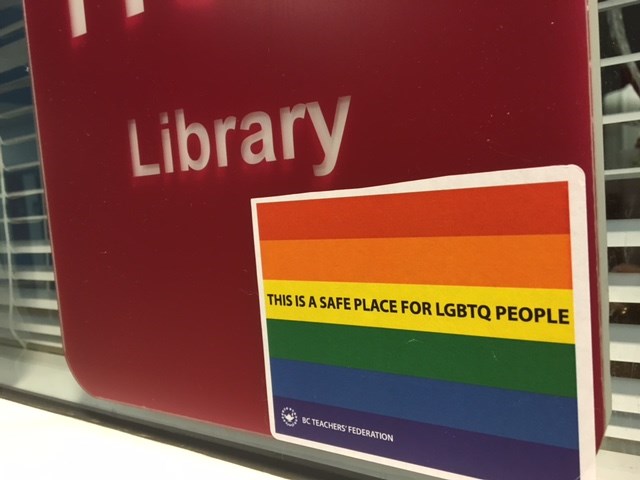‘This will really light a fire under the issue.”
Richmond School Trustee Sandra Nixon was reflecting on last week’s announcement by the B.C. government that all schools will be mandated to include specific protections for gay, lesbian and transgender students in their anti-bullying policies.
Public school districts and private schools will have until Dec. 31 to update their policies to include explicit references to sexual orientation, gender identity and expression.
Although Richmond — which partly defers in its own code of conduct to the B.C. Human Rights Code — is still one of the few districts in the province that doesn’t make specific reference to the aforementioned genders, it has been reviewing its policies with the help of students for almost a year.
However, with the district dealing with the behemoth of school closures this fall, it had hoped to hang fire until early in the new year before formalizing and introducing any new code of conduct.
“It’s good news, obviously; we’ve been waiting for the province to take the lead on this for some time,” said Nixon, who, since elected as a trustee two years ago, has been the school board’s only trustee to openly advocate for changes to the district’s policies.
“We’ve been reviewing our own code of conduct for the last year or so and the district was looking to bring this discussion to the fore this fall.
“Of course, with the deadline to incorporate into our own code of conduct now being Dec. 31, it certainly changes things, in terms of when we deal with the issue, as we may have been tempted to wait until after the new year.”
Asked why Richmond is still one of the few districts in the province not to make specific reference to sexual orientation in its code of conduct, Nixon said she hasn’t been aware of any resistance to make changes at board level or in the PAC community.
The board’s policy committee chair, school trustee Dr. Eric Yung, said his “gut reaction” to last week’s announcement was “about time.”
“But, quite honestly, I’m not sure how much it affects Richmond,” he told the Richmond News.
“We’ve been reviewing (the code of conduct) for quite some time and we have a working group, working with students; it’s a student voice initiative, getting groups together to try and figure out what students need from this.
“We were expecting some recommendations to be coming from this working group shortly and it seems like we have to be compliant by the end of the year.”
Yung said the board hasn’t seen anything final from the working group as yet, but expects, not least because of the new deadline, to have something more concrete come forward very soon.
“This doesn’t change too much, other than harden the deadline,” he added.
Asked why Richmond doesn’t have specific reference to sexual orientation in its code of conduct, much like the majority of the province, Yung said the answer is likely two-fold.
“One. While we’ve heard individual students asking for it, there hasn’t been a presentation to the board,” he said.
“And two. Personally, I want to have a policy in place that is all-inclusive; no matter what the bullying is for, period.
“No one has ever come forward asking or saying ‘hey, there is a deficiency here.’
“But we went ahead and kicked off the review anyway.
“The key thing for me, still, is education, rather than identification.
“If a whole bunch of students or whomever came to us and said, ‘you guys are wrong here,’ then I would take a look at it, but that has not been the case.”
Changes to the B.C. Human Rights Code in July recognized gender identity and expression as a protected right.
School boards in B.C. have been legally required since 2007 to have codes of conduct that directly address bullying.
The province committed to strengthening the codes in 2012 when it introduced its ERASE Bullying strategy, and in 2014 it ordered boards to reference all prohibited grounds of discrimination in the B.C. Human Rights Code.
Justice Minister Suzanne Anton said the changes announced last week will bring schools’ policies in line with amendments to the human rights code made in July that protect gender identity and expression.
The B.C. Liberals refused to amend the human rights code for years, rejecting a private member’s bill introduced four times by Opposition NDP member of the legislative assembly Spencer Chandra Herbert, who wanted the language added. The government suddenly reversed course this summer.
Chandra Herbert said in an interview Thursday that he and the New Democrats had also been pushing for the past eight years for the province to require schools to specifically protect LGBTQ kids in their anti-bullying policies.
—with a file from the Vancouver Sun



